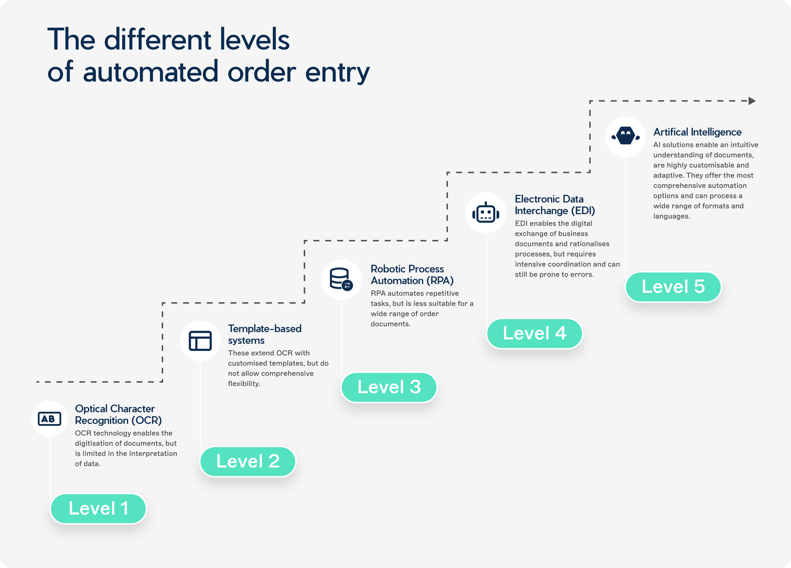Scarce resources, a lack of qualified specialists and susceptibility to errors - such challenges in order processing can set companies back considerably on their path to operational excellence. If the problems are not addressed, they have a negative impact on customer loyalty and business success.
In this article, we have a closer look at the seven most important challenges in order processing and show you how you can overcome these obstacles with the help of AI.
1. Shortage of Resources
Whether it's coping with seasonal peaks in orders or dealing with a sharp rise in demand, companies are in a constant race against time and endeavour to fulfil customer orders promptly and cost-effectively. In general, competitive pressure is high and customers today expect deliveries to be made quickly and easily at all times.
AI can help to optimise the use of resources in order processing by intelligently automating tasks and increasing productivity. This rationalises the entire process and means fewer resources are wasted. Orders are faster in the system and response cycles and corresponding delivery times can potentially be shortened. This in turn saves costs and ultimately leads to greater customer satisfaction.
2. Shortage of Skilled Labour
Companies are under increasing pressure to process a large number of orders correctly and quickly. However, keeping up with this pace is becoming increasingly difficult due to a lack of qualified labour. This can lead to delays and errors in order processing and affect customer satisfaction. Now more than ever, however, customers expect first-class service.
AI can help here by taking over routine tasks. This frees up resources that the team can then reinvest in strategic tasks and excellent customer service.
When it comes to processing orders, for example, the right AI solution can automate the entire process. Processing time is reduced and relevant data is extracted precisely. Overall, this improves efficiency and scalability across multiple channels. The team has to intervene manually less often, which reduces human error and ultimately leads to a better customer experience.
3. Error-Proneness
Errors in order processing can have far-reaching consequences, ranging from dissatisfied customers to loss of revenue. The susceptibility to errors results from various factors, including human error and system malfunctions.
Human input errors in particular can quickly lead to incorrect orders, resulting in returns that cost valuable time and money.
AI can improve accuracy in order processing. Among other things through:
- Faster and more precise data processing
- Intuitive understanding of documents
- Recognising and correcting errors in orders
- Accurate transfer of information to the ERP System
4. System Breakdowns
System breakdowns can disrupt order fulfilment and lead to delays, incorrect orders and a negative customer experience. These disruptions can be caused by a complex or outdated order management system, picking errors or poor inventory management.
AI-powered solutions can increase system reliability by automating order entry and improving the accuracy of order data.
5. No Holistic Solutions
Many companies rely on non-integrated solutions such as OCR (Optical Character Recognition), RPA (Robotic Process Automation) and EDI (Electronic Data Interchange) for order processing. However, these solutions have their limitations. OCR, for example, has difficulty correctly interpreting poor scans, handwritten content and unclear documents. In addition, deviations from defined document layouts can significantly affect the performance of OCR tools and cause problems.
Software programs that use AI for the extraction, interpretation and processing of order documents and the information they contain also provide a remedy here: they enable an intuitive understanding of documents, are highly customisable and capable of learning. They therefore offer the most comprehensive automation options and can process a wide range of formats and languages.

6. Dependencies
The dependence on factors such as seasonality, employee availability and illness can pose major challenges in order processing. Seasonal fluctuations in demand lead to fluctuations in stock levels. Team absences due to holidays or illness can impact the order fulfilment process and lead to delays and potential errors.
Artificial intelligence can help to overcome these dependencies. For example, it can
- forecast customer demand and adapt inventory management to seasonal requirements.
- analyse data to identify patterns and trends.
- automate repetitive tasks - such as order entry - so the team can focus on key strategic activities.
AI can therefore ensure that companies can navigate effectively through dependencies and work efficiently in any situation.
7. Outdated Process with High Automation Potential
Many companies still rely on outdated processes for order processing. Although these processes are functional, they are often inefficient and have a high potential for automation. In many companies, for example, order entry is still done manually, which can be time-consuming, error-prone and costly. Overall, outdated systems can lead to errors, longer processing times and poor customer experiences.
AI can revolutionise and modernise these outdated processes. When it comes to order entry, AI can be used to automatically process a wide range of formats and languages without having to set up and maintain a complicated set of rules. AI software such as Workist can be set up quickly and learns continuously. This also makes it economically attractive.
Mastering the Challenges of Order Processing with AI
Overall, companies should consider artificial intelligence as a reliable solution to master the challenges mentioned and remain competitive in the long term.
Improve Order Accuracy with AI
One advantage of AI in order processing is its ability to increase accuracy and reduce the risk of human error. The AI understands documents intuitively, regardless of language or layout, as would be the case with human processing. In addition, an AI can be configured to validate the data extracted from the documents against additional sources and recognise missing or incorrect data.
Workist uses customer and article master data for this comparison, for example, to ensure correct data extraction. If the AI does not know whether a data extraction is correct, the team provides feedback. The AI learns from the manual input and can correct the error itself the next time. In this way, data extraction becomes increasingly reliable and the software is also able to process special cases independently after a short time.
Tackling the Skills Shortage with AI
The lack of skilled labour in order processing can lead to delays and errors. AI can help to compensate for this by automating repetitive tasks that would normally have to be monitored manually.
This increases efficiency and makes processes scalable so that an increase in orders does not also mean an increase in effort. Workist, for example, processes large volumes of documents at lightning speed. Growth is therefore possible without the need for more staff, and automation even frees up valuable resources in the team, which can then be reinvested in more meaningful work - in order entry, for example, in customer meetings and value-adding sales tasks.
Hyperautomation as the Answer to Resource Shortage
Hyperautomation refers to the use of advanced technologies, such as artificial intelligence, to automate processes, increase efficiency and optimise resource allocation.
In order fulfilment, AI drives hyperautomation by ensuring that systems are seamlessly integrated and order management processes are refined. This minimises human error and streamlines inventory management processes, which in turn helps to maintain optimal stock levels and reduce waste in supply chains.
Conclusion
In the ever-changing business world, the challenges in order processing are manifold. AI is a beacon of hope that turns these challenges into optimisation opportunities. From improving accuracy to tackling skills shortages and hyper-automation, AI has the potential to revolutionise order processing.
Integrating AI into the order processing workflow can have significant benefits, including increased efficiency, greater customer satisfaction and cost savings. So the final question is not so much whether companies should use AI in order processing, but rather how quickly they can get started.

%201.jpg)
